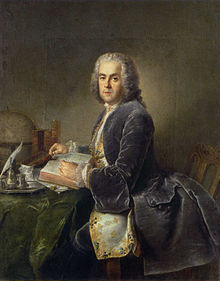Charles-Étienne Jordan (1700 in Berlin – 1745) was a Prussian-born Huguenot refugee, advisor to Frederick the Great and French-language author on literature and history. He is mainly remembered for his Histoire d'un voyage litteraire (1735) describing his literary visits in France, England and the Netherlands.[1]

In 1736 Jordan became the Crown Prince's literary secretary, in 1740 he was appointed Curator of the Universities, and in 1744 Vice President of the Prussian Academy of Sciences. At the Rheinsberg Castle he was the member of a radical intellectual circle including general Heinrich August de la Motte Fouqué.[2] Jordan was an avid collector of banned radical and "Socinian" books, obtaining copies of the Meditationes of Theodor Ludwig Lau, Jean Bodin's Colloque, and Adrian Beverland's État de l'homme for his personal library.[3]
Works
edit- Recueil de littérature, de philosophie, et d'histoire, 1730
- Histoire d'un voyage litteraire fait en MDCCXXXIII en France, en Angleterre, et en Hollande, 1735
References
edit- ^ Camille Jordan, Jean Dieudonné, René Garnier Œuvres de Camille Jordan Page xii "La branche allemande aurait, elle aussi, donné naissance à des hommes distingués et, parmi ceux-ci, il conviendrait tout particulièrement de citer Charles-Étienne Jordan, né à Berlin en 1700. Après avoir été quelque temps pasteur, ..."
- ^ Paul Corby Finney (1999). Seeing Beyond the Word: Visual Arts and the Calvinist Tradition. Wm. B. Eerdmans Publishing. p. 272. ISBN 978-0-8028-3860-5. Retrieved 27 January 2013. "... was engaged for Frederick the Great; after 1736 he was attended by, among others, Charles Etienne Jordan (1700- 1745), ... Like Heinrich August de la Motte Fouque (1698-1774), he belonged to the "Rheinsberg Circle," later also joined by ..."
- ^ Jonathan I. Israel Radical Enlightenment: Philosophy and the Making of Modernity 1650–1750 2001- Page i "One of the leading Berlin cognoscenti was the former Huguenot pastor and now deist (or at least professed Socinian) Charles Étienne Jordan (1700–45), who in 1736 became the Crown Prince's literary secretary. A savant immersed in Bayle ......In this way, Jordan obtained from Frankfurt manuscript copies of Lau's Meditationes and Bodin's Colloque, as well as Beverland's État de l'homme.59 But while Jordan proudly exhibited his expertise in this field behind closed doors, not least in ...."